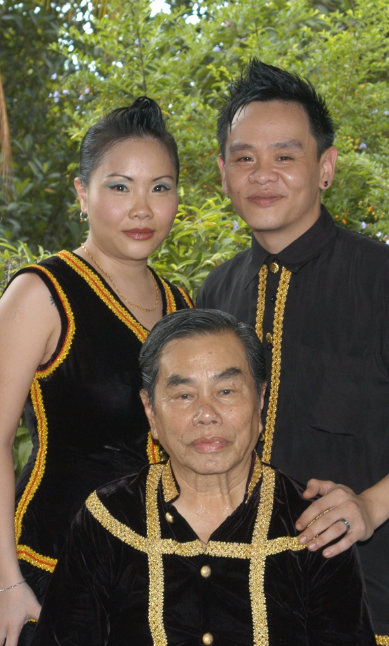Consider all the sounds that surround you every single day – birds chirping, the patter of rain against your window, your child’s laughter.
Now imagine all that fading away.
Hearing is one of the most precious gifts in our lives, as it helps us to hear and communicate with others. Unfortunately, we often take our hearing ability for granted.
For instance, how many of you wish that you can sleep through your alarm and not hear it go off? Well, Marilyn can’t hear the alarm clock at all. She’s hearing impaired.

Before this, when she slept, she had to put the mobile phone on her chest. When the alarm went off, it’s the vibrations from the phone which wakes her up. Now Marilyn wears a Mi Band that’s linked to her phone to wake her up.
I knew Marilyn at a company that I used to work for. We worked in different departments and would occasionally run into each other in meetings or at the canteen. I knew she was hearing impaired, but had never asked how she managed life with it.
So, I’d thought it would be good to share her story to create more awareness about hearing impairment, considered by many as the ‘invisible’ disability.
Marilyn, could you please share with IRL about yourself, where do you come from and what do you do?
M: I was born in Kota Kinabalu, Sabah. I’m Kadazan, and I come from a family of five children. I’ve three older sisters and one younger brother.

I’m not the only in my family who is hearing impaired – my great-grandmother, my eldest and third sister are also hearing impaired. Interestingly, the other family members who aren’t hearing impaired, can hear everything crystal clear. My mom can even hear the tap dripping from the bathroom upstairs!
I’m currently working as a corporate communications specialist with a life insurance company in Kuala Lumpur.
What was it like growing up not being able to hear properly?
M: With the exception of my eldest sister who was born with severe hearing loss, my third sister and I had only realised about our condition when we were in college.
You had no hearing problems when you were in school?

M: I’m short and I had to sit at the front in class, so I could hear the teacher very well. However, when I was in college, sitting at the back of the class with my friends, I couldn’t hear what others were saying. I also found myself looking at people’s lips to understand them. That was when I picked up lip-reading.
What course were you studying in college?
I studied A-Levels and completed my Bachelor of Law (External) programme. I recorded my class lectures with a tape recorder because I couldn’t hear what the lecturer was teaching.
Did you wear a hearing aid in college?
M: At that time, I wore a Behind-The-Ear hearing aid but I didn’t like it. That hearing aid doesn’t alter sounds according to the environment, it amplifies the sounds instead. The technology for hearing aid twenty years ago was bad.
I had negative experiences in moot court especially when the judge said things like, “Are you deaf or what?” in a derogatory manner. I wore the hearing aid but still needed to look at people’s mouths when they spoke. Just as well that I couldn’t hear sounds coming from other areas of the court room.
Although I completed my law degree, I couldn’t practise law. Imagine having derogatory remarks about my disability thrown at me on a daily basis – it would kill me. As a result, I pursued a career in Mass Communications.
Did you encounter discrimination when applying for jobs?
M: Once I applied for a job with a bank – the hiring boss was quite impressed with me during the interview but the HR person was skeptical. During the second interview, the hiring boss mentioned that he wanted to hire me but HR was concerned that my disability would deteriorate when under stress. I was outraged at such ignorance – I explained to him that everyone’s hearing deteriorates as they age, but not under stressful circumstances. Needless to say, I declined their offer.
What type of hearing aid are you wearing now?
M: I’m wearing the Inside-the-Ear hearing aid which is adjustable to surrounding sounds with a remote control. It costs RM15,000 and was kindly paid by my current company. Behind-The-Ear hearing aid costs only RM3,000 but is ineffective.
Any advice to Malaysians about hearing impairment?
M: I’ve a ‘Deaf Driver’ bumper sticker in my car and have had Malaysians flashed their headlights at me instead of honking for which I’m grateful for.
I’d like to advise Malaysians not to poke their fingers inside our ears when they see the hearing aid device. Also, please don’t stare into our ears as it makes us feel uncomfortable. If you aren’t sure, please ask and we’ll gladly explain to you.
When you speak to a deaf person, you don’t need to raise your voice. Please be sure that I’m looking at you when you speak to me.
We can work, drive, communicate and have normal relationships, we are just as normal as you are.
Have you interacted with a hearing-impaired person before? Share your experiences with us as we’d love to read your stories!
More from Real People
‘A RM100 fee cost a company 5 years of revenue’ shares M’sian
This story is about a Malaysian who learned that bureaucracy can be defeated simply by not arguing with it.A billing …
‘I quiet-quit, upskilled, and tripled my salary,’ shares M’sian engineer
This story is about a Malaysian who learned that loyalty without leverage leads nowhere in the corporate world.After years of …
‘I did everything right, and it still wasn’t enough’ shares M’sian graduate
This story is about a Malaysian graduate navigating big dreams in a job market where a degree no longer guarantees …














